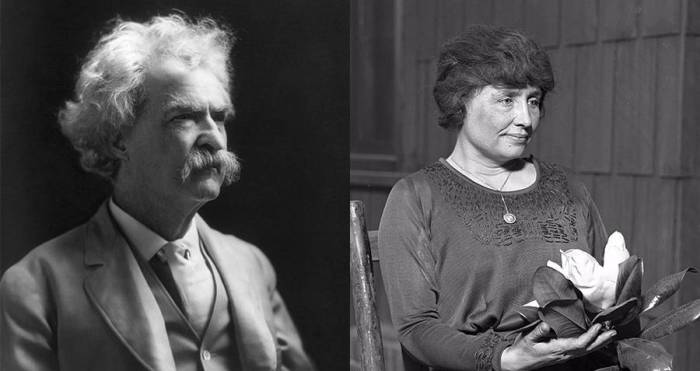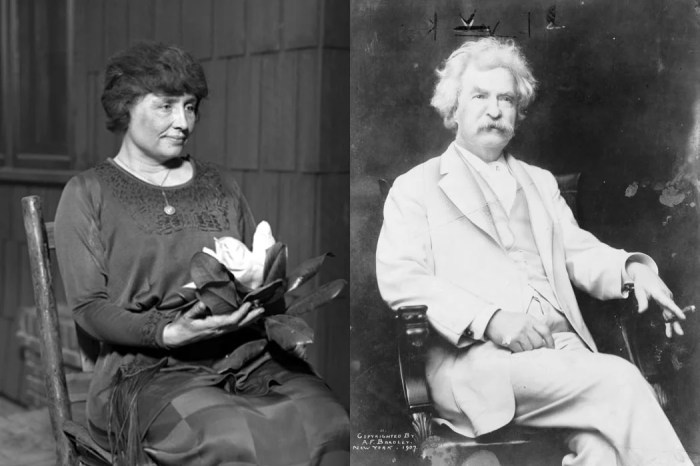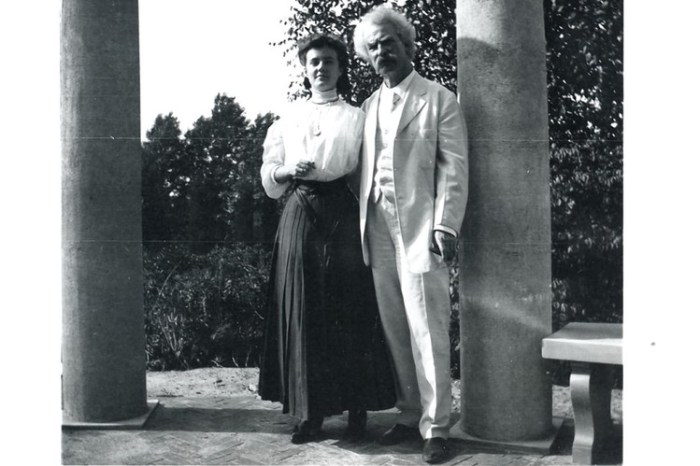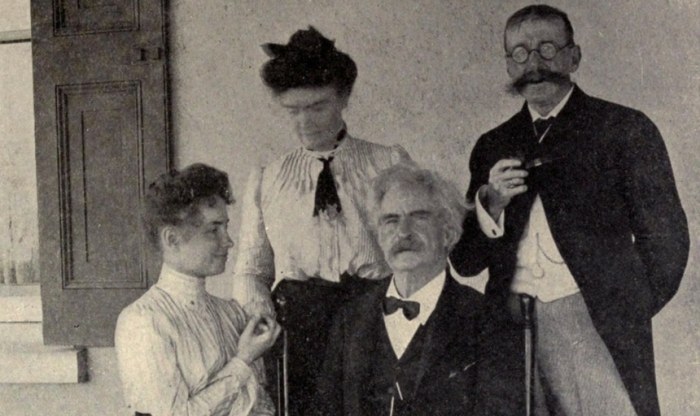Helen Keller and Mark Twain, two extraordinary figures from history, forged a profound friendship that transcended societal norms and left an enduring legacy. Their shared experiences, beliefs, and commitment to social activism intertwined their lives in a captivating and inspiring manner.
From Keller’s remarkable journey as a deaf and blind woman to Twain’s sharp wit and literary genius, their bond was a testament to the power of human connection and the transformative impact of friendship.
Historical Context

The friendship between Helen Keller and Mark Twain blossomed amidst the societal landscape of the late 19th and early 20th centuries. During this era, prevailing attitudes towards disability were often characterized by a mixture of pity, fear, and misunderstanding.
People with disabilities were frequently marginalized and excluded from mainstream society. They faced limited access to education, employment, and social opportunities. This social climate presented significant challenges for individuals like Helen Keller, who defied societal expectations with her remarkable intellect and achievements.
Societal Norms and Attitudes
During Helen Keller’s time, societal norms dictated that individuals with disabilities were often seen as objects of charity or pity. They were perceived as incapable of leading independent and fulfilling lives. This mindset stemmed from a lack of understanding and awareness about the capabilities of people with disabilities.
Moreover, negative attitudes towards disability were reinforced by prevailing medical theories. Many doctors believed that disabilities were caused by moral or genetic inferiority. This misguided notion further stigmatized individuals with disabilities and contributed to their social exclusion.
Despite these societal challenges, Helen Keller and Mark Twain forged a remarkable friendship that transcended these prejudices. Their relationship served as a beacon of hope and inspiration, demonstrating the transformative power of friendship and the indomitable spirit of individuals with disabilities.
Personal Connection

Helen Keller and Mark Twain forged an extraordinary friendship rooted in shared experiences and beliefs.
Their connection blossomed from a common bond of overcoming adversity. Keller, deaf and blind from a young age, had triumphed over her disabilities through the unwavering support of her teacher, Anne Sullivan. Twain, too, had faced challenges, including the loss of his father at a young age and the financial struggles of his family.
Shared Beliefs
Beyond their shared experiences, Keller and Twain were united by their progressive beliefs and humanitarian values. Both were ardent advocates for social justice, equality, and the importance of education.
Keller’s unwavering determination and spirit of optimism deeply resonated with Twain, who saw in her a reflection of his own belief in the resilience of the human spirit.
Literary Influence

Mark Twain’s influence on Helen Keller’s writing and education was profound. His encouragement and guidance played a pivotal role in shaping her literary career, while her experiences and insights inspired Twain’s own literary works.
Mark Twain’s Influence on Helen Keller
Twain became Keller’s mentor after meeting her in 1894. He recognized her extraordinary abilities and encouraged her to pursue a formal education. He introduced her to the world of literature and helped her develop her writing skills. Twain’s influence is evident in Keller’s writing style, which is characterized by its clarity, simplicity, and powerful imagery.
Helen Keller’s Influence on Mark Twain
Keller’s experiences as a deaf-blind person provided Twain with a unique perspective on the human condition. Her resilience and determination inspired him to explore themes of empathy, compassion, and the importance of communication in his works. Twain’s novel The Adventures of Huckleberry Finn, for example, reflects Keller’s experiences with prejudice and isolation.
Helen Keller, the deaf and blind author, and Mark Twain, the celebrated humorist, were close friends. They shared a love of language and a passion for social justice. If you’re curious about mathematical equations, you might want to check out this link: solve for z 3z 5 2z 25 5z . Their friendship was a testament to the power of human connection and the importance of embracing diversity.
Social Activism

Helen Keller and Mark Twain shared a deep commitment to social activism, particularly advocating for the rights of people with disabilities. Keller, who was deaf and blind from a young age, became a prominent advocate for the disabled, while Twain used his literary influence to raise awareness about their struggles.
Keller’s Advocacy
- Founded the American Foundation for the Blind in 1925, which provided education, employment, and support services to people with visual impairments.
- Lobbied for legislation to improve the lives of the disabled, including the Helen Keller National Center Act, which established a national center for research and training on deaf-blindness.
- Spoke out against discrimination and prejudice faced by people with disabilities, using her platform to challenge societal norms and promote inclusion.
Twain’s Advocacy, Helen keller and mark twain
- Wrote satirical essays and stories that highlighted the plight of the disabled, such as “The Man That Corrupted Hadleyburg” and “The Mysterious Stranger.”
- Used his humor and wit to challenge stereotypes and expose the hypocrisy of those who marginalized the disabled.
- Supported Keller’s work and promoted her activism through his writings and public appearances.
Legacy and Impact

The friendship between Helen Keller and Mark Twain left an enduring legacy that continues to inspire people today. Their bond transcended their differences and became a symbol of the power of compassion, understanding, and perseverance.
Keller’s story of overcoming adversity and Twain’s wit and social commentary resonated with people from all walks of life. Their friendship taught the world the importance of empathy, acceptance, and the pursuit of knowledge.
Inspiration and Motivation
- Their story has inspired countless people with disabilities to believe in their own potential and to strive for greatness.
- Their writings and speeches have motivated social activists to fight for the rights of the marginalized and to challenge societal norms.
- Their friendship serves as a reminder that even the most different of people can find common ground and build meaningful relationships.
Common Queries: Helen Keller And Mark Twain
What was the nature of Helen Keller and Mark Twain’s friendship?
Their friendship was based on mutual respect, shared experiences, and a common belief in the power of education and social justice.
How did Helen Keller’s disability influence her friendship with Mark Twain?
Keller’s deafness and blindness shaped her perspective on the world, which Twain found both fascinating and inspiring.
What were some of the ways in which Helen Keller and Mark Twain collaborated on social activism?
They worked together to raise awareness about the rights of people with disabilities and to challenge societal prejudices.